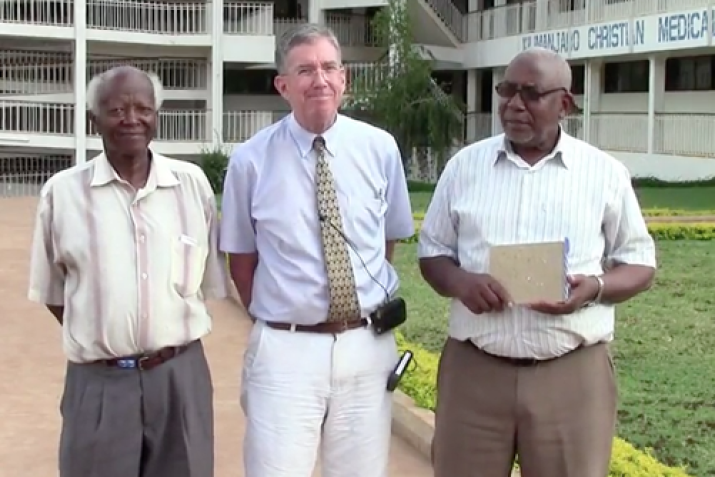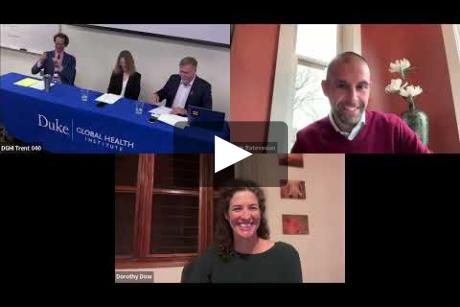
Tropical Parasitology course instructors Mramba Nyindo (KCMUC), John Bartlett, and Franklin Mosha (KCMUC) at Kilimanjaro Christian Medical University College in Moshi, Tanzania
Published February 3, 2015, last updated on June 3, 2020 under Education News
In just a few days, Duke University will launch its first massive open online course (known as a MOOC) created in collaboration with an African university. The course, “Tropical Parasitology: Protozoans, Worms, Vectors and Human Diseases,” will be taught by DGHI professor John Bartlett and two tropical parasitology professors from Kilimanjaro Christian Medical University College (KCMC) in Tanzania: Mramba Nyindo and Franklin Mosha.
The 8-week course is free and open to anyone in the world, but it was created with a particular audience in mind: medical and health sciences students in sub-Saharan Africa. (Duke Magazine described the background of the course in its Summer 2014 issue.) At KCMC, 269 medical students will use the online course to supplement in-class learning.
In addition, the course is also being promoted for use at a network 13 African medical schools, an effort that is part of an NIH-sponsored Medical Education Partnership Initiative (MEPI) to increase the number of new health care workers in the region.
The course features interviews with practicing doctors and video filmed in the field to illustrate important concepts and examples to give students a rich background in treating and preventing tropical disease. “It's very enriching that most of the course is taught by African experts, who have great expertise and experience with these diseases,” said Bartlett.
To register, visit the “Tropical Parasitology: Protozoans, Worms, Vectors and Human Diseases” course page on the Coursera website.
"Gateway" Course Offers Intro to Global Health through Videos and Interviews
DGHI’s David Boyd has traveled and conducted research in more than 60 countries, working on projects like creating health education programs for indigenous communities in Guatemala and examining the efficacy of traditional medicine in China and sub-Saharan Africa. Boyd is now trying to have a global impact through a different means: a five-module MOOC titled “The Challenges of Global Health.”
Boyd’s goal is to offer a “gateway course”—a short course for individuals with little or no experience in global health, such as high school or beginning college students who are trying to determine if they should pursue a degree in the field. It is one of Duke’s first on Coursera to be offered on-demand. Coursera’s on-demand courses do not have start dates or deadlines and are self-paced, allowing users to complete courses on their own schedule.
“The most important thing to teach is global health literacy; in other words, to understand the very basic concepts of what global health is and how it works,” said Boyd. Participants will learn about key global health challenges, the complexes causes of these challenges, and important global health actors working on solutions.
The course will look in particular at the developing world, not only through lecture videos but through several interviews with experts and videos Boyd has filmed of his work in the field on five continents. “One thing I emphasize throughout is our global interdependence, and not just of humans, but rather of humans, animals, and the environment,” said Boyd.
Boyd likes the on-demand option because the content can be more easily adapted by educators who want to use it as part of their own curriculum. “If teachers want to use it in classes, they have much more control over the flow.” Boyd, in turn, is interested to hear about creative ways teachers use these materials with students.
To register for “The Challenges of Global Health,” visit the course page on Coursera. For more information on open courses and online education at Duke, visit the Online Education Initiatives website.


